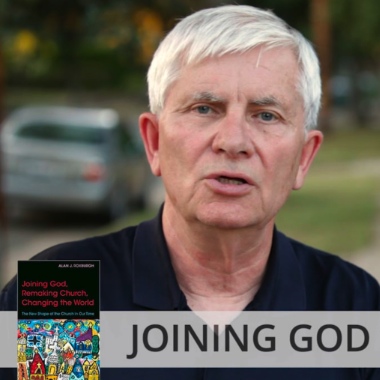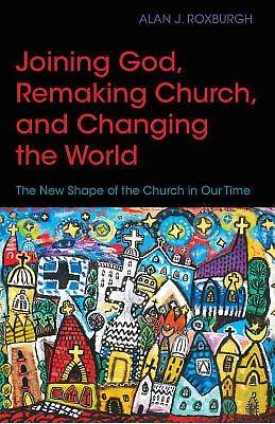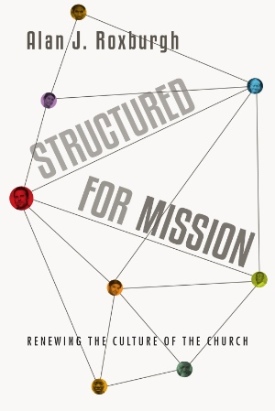
Alan Roxburgh has written two new books which urge his readers “to discern what God is up to ahead of us in the communities where we dwell.”
“Alan Roxburgh is a father figure to many of us in the missional movement and like everything he writes, this is a smart book and a wise one.” So says Michael Frost – himself a leading missional figure – about the Vancouver-based author of Structured for Mission.
In the following comment (re-posted by permission from his own TMN (The Missional Network) website), Roxburgh describes the process that led to writing that book and another new one, Joining God, Remaking the Church and Changing the World.
Writing for me is an intensive task, a journey of discovery. It is how I wrestle with questions about the place of the church in our time. In writing I try to discern the underlying reasons that cause people in church systems to think and act as they do.
In this wrestling I am encountered by new questions that would never have occurred to me. Writing involves this two-sided occupation of excavating into the questions and climbing into new questions.
I don’t write like an idealist (I hope) who somehow is grasped by a big picture or image of how things ought to be and trying to convince as many as possible to hook their wagon to my big dream. I have little patience for this kind of writing. It not only misdirects people away from the hard work of excavation but also short circuits the critical work of climbing.
My writing comes out of asking what is happening in ordinary congregations and among leaders. It is tentative because underneath my writing lies a single question: How do we discern what the God of Jesus Christ is up to right in our backyards in order to join with this God?
This sets the stage to answer the question of why I wrote my two recent books Structured for Mission and Joining God, Remaking the Church and Changing the World. Each book has a particular audience and responds to what I see happening across North America and Europe within my own tribe – the euro-tribal churches.
These are the church systems seeded around the globe by European colonizations that deemed the various European reformations of the 16th century forward as somehow the finalized form of Christian life for all peoples at all times.
Obviously, this narrative has come to a stunningly painful end. Deeply colonizing and racist instincts remain on both the right and the left. Many still believe that the euro-tribal church is still really first among ‘equals.’
Joining God
 Joining God, Remaking the Church and Changing the World is addressed to congregations and their leaders. Many euro tribal congregations have been in steep decline for a long time. Some have resisted this decline by adapting their religious goods and services to the felt-needs of varying generational groups. I’ve observed several things about this situation.
Joining God, Remaking the Church and Changing the World is addressed to congregations and their leaders. Many euro tribal congregations have been in steep decline for a long time. Some have resisted this decline by adapting their religious goods and services to the felt-needs of varying generational groups. I’ve observed several things about this situation.
First, for more than half a century, these churches and their leaders have been continuously operating from the assumption that their most important job is to “fix” the church and make it relevant again. The methods for doing this are diverse and outlined in the book. My conviction is that we are long past the point of ‘fixing’ the church. The church is simply not the focal point. I call this the ecclesiocentric default.
Second, despite endless books on ‘biblical’ perspectives for fixing the church the massive missing piece is any conviction that God is the primary active agent in the world and the church. Most church actions are driven by human agency, with modernity’s wager, namely, that all of life can be lived well and managed well without any actual reference to God. This is like a tip of the hat (calls to prayer or Bible quotes to support proposals) toward God, like an American president saying “God bless America” after every speech, or English people singing “God Save the Queen” at every meeting. These are wonderful moments for an emotional lift but otherwise empty.
I wrote this book as a small pamphlet to make this clear. I wanted to point out that there is no future for euro-tribal churches until we learn again that God is out ahead of us in our neighbourhoods and communities, inviting us to lay down our needs to fix and make the church work in order to join God in the places we live.
Structured for Mission
 Structured for Mission has a different purpose. As the decline of the euro-tribal churches accelerates, many are looking around for places to lay the blame or find ways of fixing the denominational systems. Favourite whipping posts are institutions and structures. I hear people talking negatively about the institutional church or the old structures. These now popularly represent the causes of the malaise.
Structured for Mission has a different purpose. As the decline of the euro-tribal churches accelerates, many are looking around for places to lay the blame or find ways of fixing the denominational systems. Favourite whipping posts are institutions and structures. I hear people talking negatively about the institutional church or the old structures. These now popularly represent the causes of the malaise.
Two opposite dramas are occurring. On one side stand the anti-institutional champions of change calling for the demolition of existing structures. On the other are those who want to find yet more ways of fixing these structures.
I wrote this book to do several things:
1. Show how misdirected both these approaches are.
2. Explain that institutions and structures are expressions of deeper narratives. (Without understanding these underlying narratives we will not discern how to address the challenges before these church systems.)
3. I outline a way forward that is neither the jettisoning of institutions nor one more valiant attempt to fix them.
Both books make hard critiques of the ways euro-tribal congregations and denominations are addressing their great unraveling. They do this, however, from the conviction that God is present in and out ahead of these churches even yet. The vocational call is not to try to fix our churches and denominations nor to abandon them with some declaration of Ichabod (the glory has departed).
The vocational call is, rather, to dwell deeply in ways that begin to discern what God is up to ahead of us in the communities where we dwell.
Both books offer practical suggestions for this engagement. It is refocusing the source of our hope from our own agency to that of God. This requires the hard work of understanding and discernment. There are no short cuts or quick fixes.
Alan Roxburgh lives on the North Shore, but spends much of his time consulting internationally. Fortunately, he has found time to work locally with the Lutherans, the Anglicans and no doubt with others.
As a side note, Vancouver is fortunate to have the number of missional thinkers that we do – God must think we need particular help! A couple of weeks ago, I pointed to Darrell Guder and his work with the Centre for Missional Leadership. We have posted several pieces from the writings of Cam Roxburgh, Anthony Brown and their Forge Canada team. Ross Hastings at Regent College wrote Missional God, Missional Church a couple of years ago. Michael Goheen, who was, among other roles (until recently at least), pastor of preaching at New Westminster Christian Reformed Church, wrote A Light to the Nations: The Missional Church and the Biblical Story. The list could probably go on . . . forgive me, and enlighten me, if I’ve missed others.
